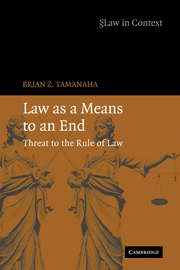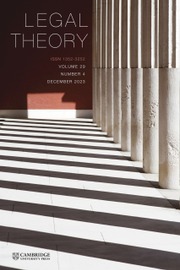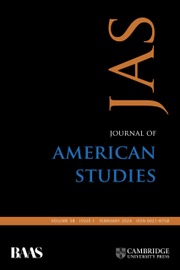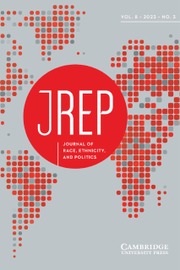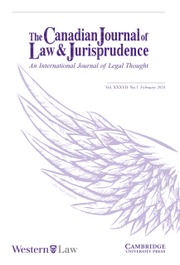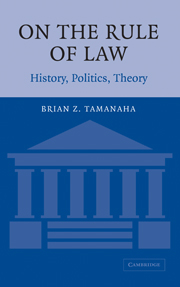Law as a Means to an End
Threat to the Rule of Law
$47.99 (C)
Part of Law in Context
- Author: Brian Z. Tamanaha, St John's University Law School, New York
- Date Published: October 2006
- availability: Available
- format: Paperback
- isbn: 9780521689670
$
47.99
(C)
Paperback
Other available formats:
Hardback, eBook
Looking for an examination copy?
If you are interested in the title for your course we can consider offering an examination copy. To register your interest please contact collegesales@cambridge.org providing details of the course you are teaching.
-
The contemporary US legal culture is marked by ubiquitous battles among various groups attempting to seize control of the law and wield it against others in pursuit of their particular agenda. This battle takes place in administrative, legislative, and judicial arenas at both the state and federal levels. This book identifies the underlying source of these battles in the spread of the instrumental view of law - the idea that law is purely a means to an end - in a context of sharp disagreement over the social good. It traces the rise of the instrumental view of law in the course of the past two centuries, then demonstrates the pervasiveness of this view of law and its implications within the contemporary legal culture, and ends by showing the various ways in which seeing law in purely instrumental terms threatens to corrode the rule of law.
Read more- Provides a unique historical and contemporary account of the spread and entrenchment of the idea that law is a means to an end
- Draws upon legal history, legal theory, and legal sociology
- Provides an overview of the U.S. legal culture - past, present, and future
Reviews & endorsements
"Brian Tamanaha's Law as a Means to an End is something very rare--a book that has the potential to change thinking about the law in fundamental ways. The book accomplishes three substantial tasks with admirable brevity, erudition, and clarity. First, it traces the history of 'legal instrumentalism' in Nineteenth and Twentieth century jurisprudence and legal practice--a compelling story that illuminates the origins of our most basic assumptions about law. Second, it traces the pervasive influence of instrumentalist thinking in contemporary legal thought--acutely diagnosing the intellectual underpinnings of phenomena as diverse as 'cause lawyering' and the 'law and economics movement' in the legal academy. Third, it makes a compelling argument that the rise of instrumentalism has a fundamentally corrosive effect on the rule of law. This is not just an important book--it is THE important book of legal theory for this decade. Law as a Means to an End is superb."
--Lawrence Solum, John E. Cribbet Professor of Law, University of Illinois College of Law
See more reviews"The great scholar Grant Gilmore once asked in the title of a fascinating book, 'Is Contract Dead?' and went on to answer, 'yes.' Brian Tamanaha does him one better. In this book he asks, 'Is Law Dead?' His answer: 'almost.' Law, he reports, is in danger of succumbing to instrumentalism and as such losing its vitality. Much of modern legal scholarship seeks to make law a branch of applied economics. This book pushes against that movement, as well as many other related "realist" movements. Whether one agrees or disagrees with Tamanaha, he or she will be wiser after having read this fine book."
--Malcolm M. Feeley, Claire Sanders Clements Dean's Professor, Boalt Hall School of Law, University of California at Berkeley"Brian Tamanaha sounds a firebell in the night. He shows how the most progressive modern approaches to law, by undermining beliefs in its objectivity and formal rationality, and its rootedness in natural or customary standards of right conduct, have fatally undermined its claims to restrain power-seeking or serve the common good. Law is now seen simply as an instrument -- not as a limit on greed and power, but a means by which interests pursue their own selfish ends. And it's not only interest-groups and their lawyers, but judges and jurists, who have signed on to an instrumentalism that challenges the very ideas of the rule of law and the public interest. Tamanaha is not a nostalgic romantic. He does not think the old days can or should be recovered. He does not tell us what to do. But he illuminates our predicament with succinct history, clear-headed observation, and unflinchingly bleak analysis."
--Robert W. Gordon, Chancellor Kent Professor of Law and Legal History, Yale University"Taken as a whole, Tamanaha's book makes a significant contribution to the scholarly understanding of the rule of law in American jurisprudence....Tamanaha's book provides a superb overview of the emergence of instrumentalism as the primary perspective on law in contemporary America. The evidence he marshals to support this conclusion is impressive, leaving little doubt as to the validity of his assertions...Law as a Means to an End is an outstanding treatment of an important scholarly question with profound normative implications for American society."
--Paul M. Collins, The Law and Politics Book Review"...In Law as a Means to an End, Tamanaha argues that the instrumental view of law, coupled with a general breakdown in our ability to reach a cencensus about which ends law should serve, poses a serious risk to the rule of law..."
--Robert T. Miller, Villanova University School of law, FIRST THINGSCustomer reviews
Not yet reviewed
Be the first to review
Review was not posted due to profanity
×Product details
- Date Published: October 2006
- format: Paperback
- isbn: 9780521689670
- length: 268 pages
- dimensions: 228 x 155 x 18 mm
- weight: 0.38kg
- availability: Available
Table of Contents
Introduction
Part I. The Spread of Legal Instrumentalism:
1. Non-instrumental views of law
2. Changing society and common law in the nineteenth century
3. Nineteenth century legislation and legal profession
4. Instrumentalism of the legal realists
5. Twentieth century Supreme Court instrumentalism
Part II. Contemporary Legal Instrumentalism:
6. Instrumentalism in legal academia in the 1970s
7. Instrumentalism in theories of law
8. Instrumentalism in the legal profession
9. Instrumentalism of cause litigation
10. Instrumentalism and the judiciary
11. Instrumentalism in legislation and administration
Part III. Corroding the Rule of Law:
12. Collapse of higher law, deterioration of common good
13. The threat to legality
Epilogue.
Sorry, this resource is locked
Please register or sign in to request access. If you are having problems accessing these resources please email lecturers@cambridge.org
Register Sign in» Proceed
You are now leaving the Cambridge University Press website. Your eBook purchase and download will be completed by our partner www.ebooks.com. Please see the permission section of the www.ebooks.com catalogue page for details of the print & copy limits on our eBooks.
Continue ×Are you sure you want to delete your account?
This cannot be undone.
Thank you for your feedback which will help us improve our service.
If you requested a response, we will make sure to get back to you shortly.
×
